Hypoponera punctatissima (Roger)
 Type location Germany
(Ponera punctatissima, Roger, 1859: 246, illustrated, worker
& queen; "in hothouses", ergatogyne male, Emery, 1909c: 373) - see below Type location Germany
(Ponera punctatissima, Roger, 1859: 246, illustrated, worker
& queen; "in hothouses", ergatogyne male, Emery, 1909c: 373) - see below
Junior synonyms
androgyna (Roger, 1859: 246, footnote, male;
synonymy Emery & Forel, 1879: 455) from Germany - no images on Antweb (March 2019)
exacta (Ponera
punctatissima Roger var. exacta
n. var. (= Ponera punctatissima
Sants., 1921 non Roger), Santschi, 1923a: 134, worker; synonymy
Atanassov & Dlussky, 1992: 71) from Tunisia, Hammamet,
coll. F Santschi - see below
jugata (Ponera
punctatissima Roger race P.
jugata
n. stirps, Forel, 1892l: 251, queen) from Madagascar - see http://www.antweb.org/specimenImages.do?code=casent0101875
tarda (Ponera tarda,
sp. n., Charsley, 1877: 162, worker & queen; synonymy
Dalla Torre, 1893: 41) from Great Britain, location not given -
see http://www.antweb.org/specimenImages.do?code=casent0901973
all forms described
(combination in Hypoponera, Taylor, 1967; new definition
Seifert, 2003b: 61)  . .
|
Synonymy in Bolton & Fisher (2011: 16) - http://www.mapress.com/zootaxa/list/2011/2843.html
punctatissima
(Roger, 1859)
= androgyna (Roger, 1859)
= tarda (Charsley, 1877) -
see above link
= punctatissima r. jugata (Forel, 1892)
= ergatandria (Forel, 1893) - see https://www.antweb.org/specimenImages.do?code=casent0915195
= kalakauae (Forel, 1899) -
see http://www.antweb.org/specimenImages.do?code=casent0902537
= punctatissima subsp. schauinslandi (Emery, 1899) syn.
rev.
= ergatandria subsp. bondroiti (Forel, 1911) syn. n. -
see http://www.antweb.org/specimenImages.do?code=casent0902540
= dulcis var. aemula (Santschi, 1911) syn. n. -
see http://www.antweb.org/specimenImages.do?code=casent0915194
= ergatandria st. cognata (Santschi, 1912) syn. n. - see https://www.antweb.org/specimenImages.do?code=casent0915190
= ragusai var. sordida (Santschi, 1914) syn. n. -
see http://www.antweb.org/specimenImages.do?code=casent0915206
= incisa (Santschi, 1914)
syn. n.
= sulcatinasis r. durbanensis (Forel, 1914) syn. n. -
dark brown - see http://www.antweb.org/specimenImages.do?name=casent0907325
= ergatandria r. petri (Forel, 1916) syn. n.
= brevis (Santschi, 1921)
syn. n. - see https://www.antweb.org/specimenImages.do?code=casent0915187
= punctatissima v. exacta (Santschi, 1923) - see below
= mina (Wheeler, 1927) - no
images on Antweb (March 2019)
= argonautorum (Arnol’di,
1932) syn. n. - no
images on Antweb (March 2019)
= mumfordi (Wheeler, 1933) - no
images on Antweb (March 2019)
= mesoepinotalis (Weber,
1942) syn. n. - no
images on Antweb (March 2019)
= breviceps (Bernard, 1953)
syn. n. - see https://www.antweb.org/specimenImages.do?code=casent0915475
= ursoidea (Bernard, 1953)
syn. n. - see https://www.antweb.org/specimenImages.do?code=casent0915474
= sulcitana (Stefani, 1970)
syn. n. - no
images on Antweb (March 2019)
|
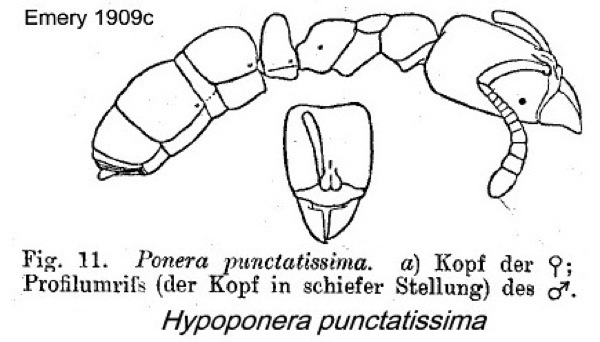 Roger's
(1859, 1860) description is at Roger's
(1859, 1860) description is at  . Charsley's
(1877) description of Ponera tarda
is at . Charsley's
(1877) description of Ponera tarda
is at  .
Forel's
(1892l) description of jugata
is at .
Forel's
(1892l) description of jugata
is at  .
Emery (1909c: 373) gave an illustrated
description, this is at .
Emery (1909c: 373) gave an illustrated
description, this is at  . Santschi (1921e) gave an illustrated
description, this is at . Santschi (1921e) gave an illustrated
description, this is at  . Santschi (1923a) gave a further note,
with a naming of exacta, this is at . Santschi (1923a) gave a further note,
with a naming of exacta, this is at  . He accepted that the length of the scape
varied between populations and was often shorter than in his (1921e)
drawing, which he said was of exacta. . He accepted that the length of the scape
varied between populations and was often shorter than in his (1921e)
drawing, which he said was of exacta.
Bernard's key (1952, now probably incorrect) has it as -
TL 2.5-3.0, head large, with convex sides; clypeus and thorax matt,
dull red; mandibles with 5 large, spaced out, teeth.
Collingwood (1985, illustrated), reporting it from Saudi
Arabia, noted that the frontal furrow on the face continues as a thin
line.
|
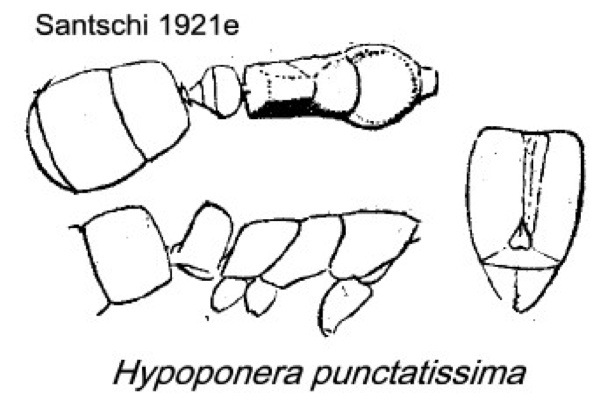 Seifert
(2003b: 61ff - http://antbase.org/ants/publications/21154/21154.pdf)
reported an analytical study of specimens previously identified as Hypoponera
punctatissima or varieties. This led him to separate off Hypoponera
schauinslandi (Emery) as a distinct sibling species, type
location Hawaii,with an African synonym aemula, formerly Ponera
dulcis var. aemula Santschi, type location Tanzania. Also Hypoponera
indifferens Forel (1895), type location Madagascar. (Forel, 1895c:
245, worker & queen). Seifert gave a review of the habitat
requirements of punctatisssima and schauinslandi in
Europe north of 40° latitude. This strongly suggests punctatisssima
is endogenous to temperate Europe, i.e. tolerant of relatively cool,
dry climates. H. schauinslandi is found only in hothouse
situations in Europe, with air temperatures constantly above 19°C
(usually between 22°C and 27°C) and appears to have its origins in the
humid tropics. Thus Seifert characterized the latter as a "tropical,
cosmopolitan, tramp species". Seifert
(2003b: 61ff - http://antbase.org/ants/publications/21154/21154.pdf)
reported an analytical study of specimens previously identified as Hypoponera
punctatissima or varieties. This led him to separate off Hypoponera
schauinslandi (Emery) as a distinct sibling species, type
location Hawaii,with an African synonym aemula, formerly Ponera
dulcis var. aemula Santschi, type location Tanzania. Also Hypoponera
indifferens Forel (1895), type location Madagascar. (Forel, 1895c:
245, worker & queen). Seifert gave a review of the habitat
requirements of punctatisssima and schauinslandi in
Europe north of 40° latitude. This strongly suggests punctatisssima
is endogenous to temperate Europe, i.e. tolerant of relatively cool,
dry climates. H. schauinslandi is found only in hothouse
situations in Europe, with air temperatures constantly above 19°C
(usually between 22°C and 27°C) and appears to have its origins in the
humid tropics. Thus Seifert characterized the latter as a "tropical,
cosmopolitan, tramp species".
My feeling, therefore, is that the reports of H.
punctatissima from sub-Saharan Africa, including my own from
Nigeria, are very likely to be of H. schauinslandi.
|
Seifert (2003b) unfortunately chose to use a set of
different measurements, or at least to use different names for the
measurements. Thus -
CL = maximum cephalic length in median line (i.e similar to HL but
taken from the lowest point of any concavity of the occipital margin to
the upper clypeal prtrusion
CW = maximum cephalic width, i.e = HW
CS = cephalic index, arithmetic mean of CL and CW
Eyepos = difference between a posterior reference point, apparently
where a transverse line from the eye centres transect the median
longitudinal line of the head
|
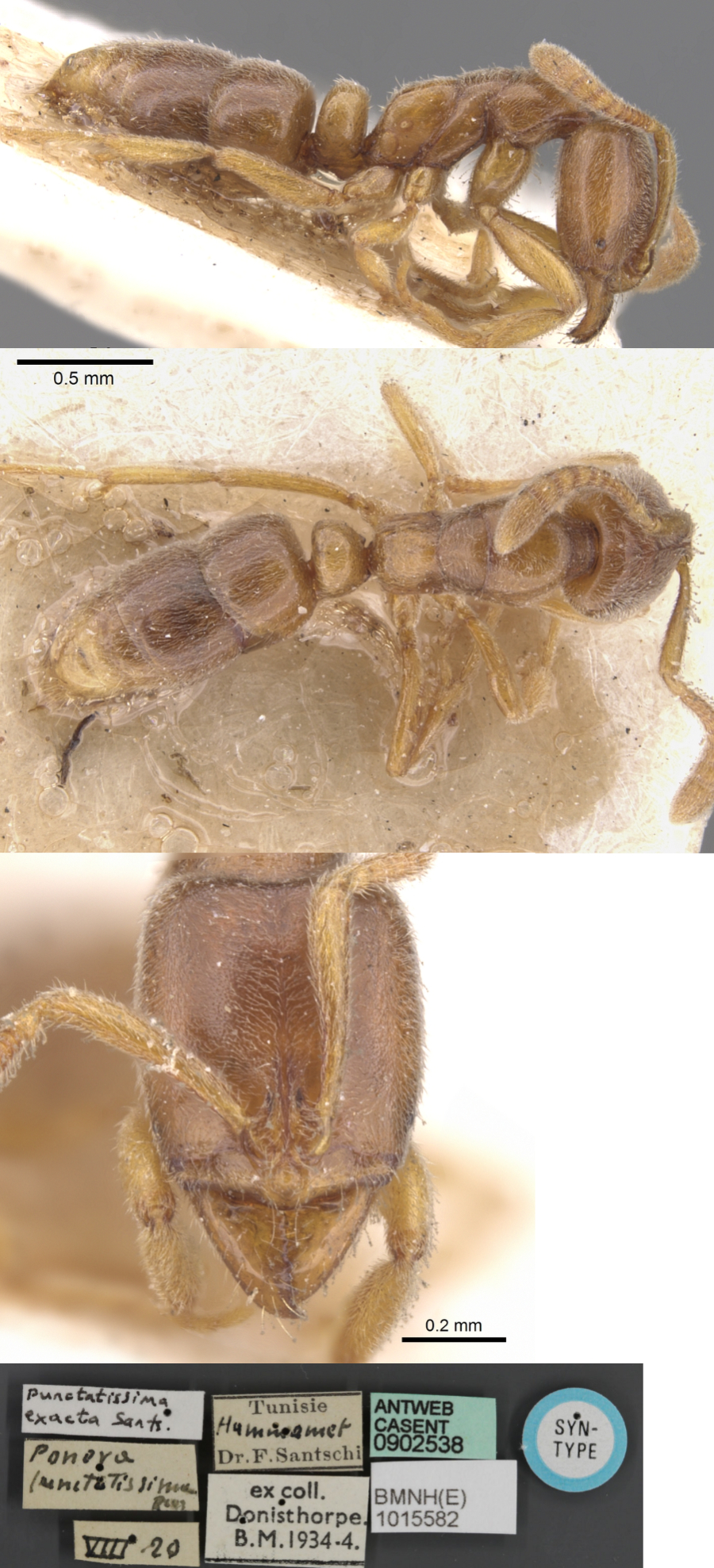 The
photomontage of a syntype worker of exacta is collated http://www.antweb.org/specimen.do?name=casent0902538. The
photomontage of a syntype worker of exacta is collated http://www.antweb.org/specimen.do?name=casent0902538.
|
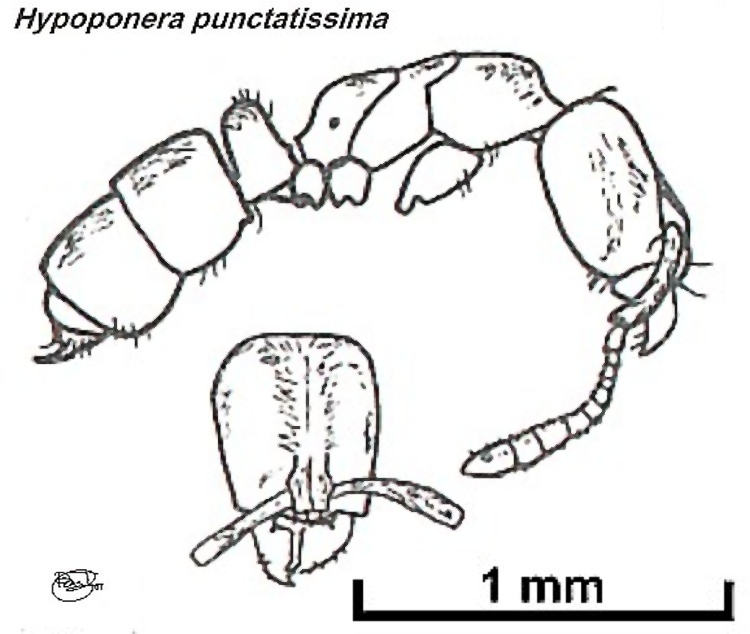 Nigeria
specimens (as Hypoponera punctatissina, Taylor, 1976: 21).
WORKER. TL 2.46 mm, HL 0.58, HW 0.47, SL 0.39, PW 0.34 Nigeria
specimens (as Hypoponera punctatissina, Taylor, 1976: 21).
WORKER. TL 2.46 mm, HL 0.58, HW 0.47, SL 0.39, PW 0.34
Seifert measurements: CS = 525 CL/CW 123 SL/CS = 0.742)
Colour dark yellow-brown, shiny with dense pilosity. Eyes absent.
Metanotal groove distinct.
I collected it from in an old tree stump, in dead wood and in soil,
some 5-7 cm deep, the Cocoa Research Institute of Nigeria, Idi Ayunre.
|
 The
photomontage is of a worker from Gabon, Pongara National
Park; collector
Yves Braet (Gabon 194). The
photomontage is of a worker from Gabon, Pongara National
Park; collector
Yves Braet (Gabon 194).
|
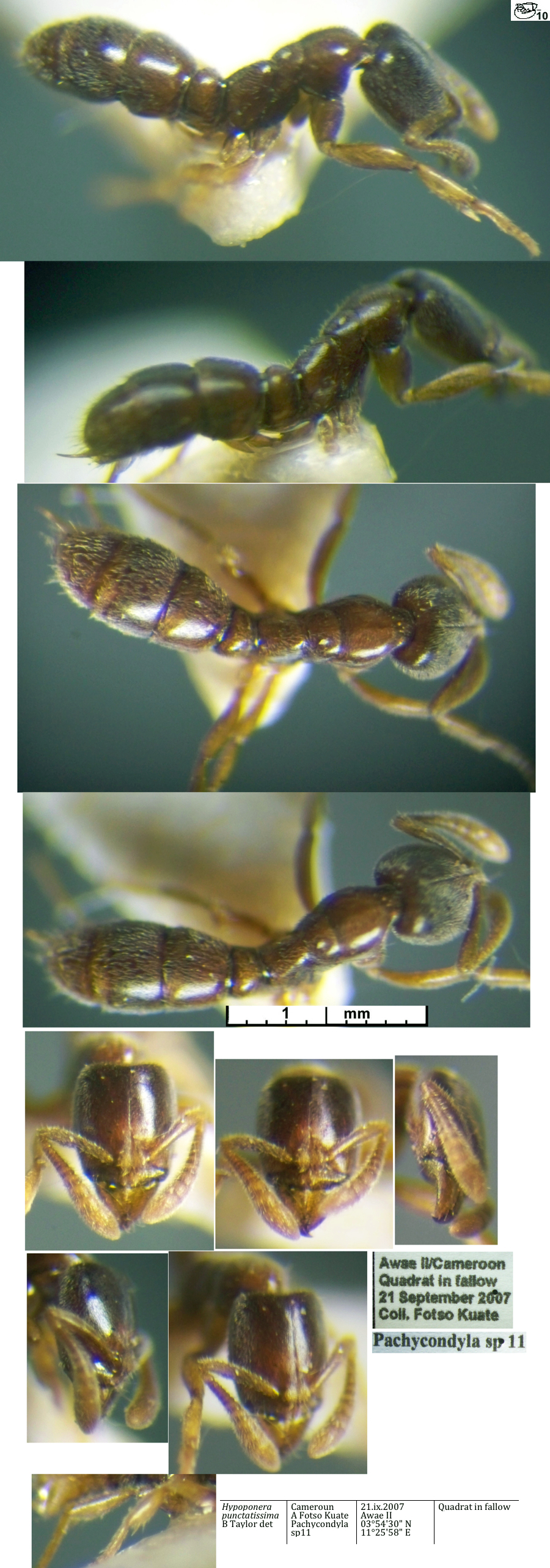 The photomontage is of
a worker from Cameroun, Awae II; collector A Fotso Kuate. The photomontage is of
a worker from Cameroun, Awae II; collector A Fotso Kuate.
. Previously listed by me
as H. brevis
|
 The photomontage is of
a queen from Central African Republic, Dzanga-Sangha NP;
collector Philippe Annoyer. The photomontage is of
a queen from Central African Republic, Dzanga-Sangha NP;
collector Philippe Annoyer.
A similar queen from Mauritius can be seen at http://www.antweb.org/specimen.do?name=casent0055829
|
|